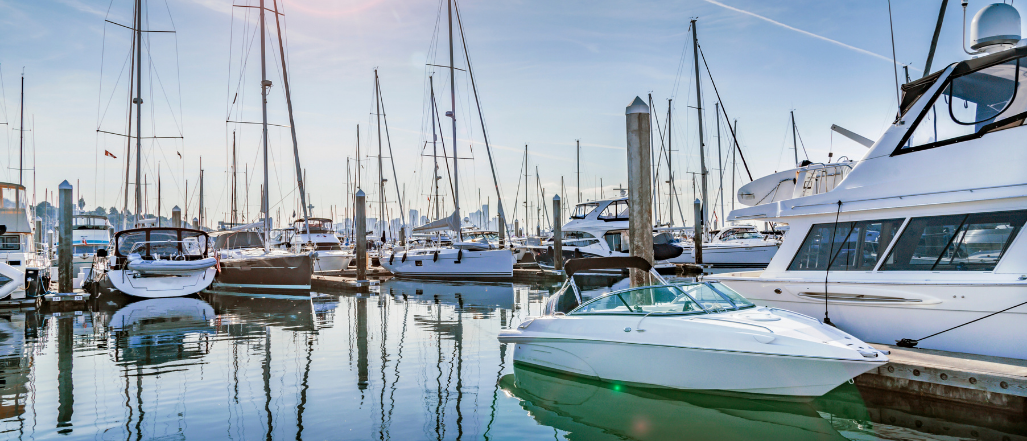Summary
Sailing and water-based leisure activities are common during the summer. If you possess a boat or are contemplating purchasing one, boat insurance should also be on your mind.
- Even though states do not usually mandate boat insurance, it is wise to safeguard your investment. Moreover, many marinas necessitate boat insurance if you’re leasing a slip or utilizing a mooring.
- Boat insurance can cover accidental damage from collisions, liability for injuries or property damage, and damage during boat transportation.
Having insurance for your boat is crucial in various situations. These include being on the water, transporting it on a trailer, or storing it on land. Insurance protects you from financial losses associated with damage to your boat. Similarly, you require liability coverage if someone sustains an injury while on your boat.
Although most states don’t require boat insurance, it’s a good idea. Some marinas might even require you to have coverage if you are renting a slip or using a mooring. Of course, if you are financing your boat, your lender may require you to have insurance coverage.
See how to save
on insurance

Who Needs Boat Insurance?
If you have a boat or other watercraft, you will likely need to get a specialized watercraft insurance policy to cover it.
Standard homeowners insurance policies will only cover small boats, typically those that do not have a motor. Large sailboats are an exception; despite having no motor, you’ll still need boat insurance. Talk to your insurance agent if you have any questions about insuring your sailboat.
A homeowners policy frequently covers canoes, kayaks, and small rowboats, so they do not require separate boat insurance. However, it’s a good idea to check with your agent to see if there is a limit to the value covered.
Common limits included in a homeowners insurance policy are $1,000 to $2,000. For example, if you purchased a canoe for $4,000 and your homeowners insurance deductible was $500 with a policy limit of $1,000, and your canoe was stolen, you would need to cover a lot of the cost of replacement out-of-pocket.
Even if your homeowners policy covers your boat, make sure you understand the details. Some home insurance policies cover your boat or canoe only if it sustains damage at your residence. They do not provide coverage while it is in transit or on the water. Before taking your small craft on the water, know the specifics of your homeowners insurance policy.
If you buy a motorboat, pontoon boat, or yacht, you need boat insurance because your homeowners insurance won’t cover them. Various factors determine the cost of your boat insurance. These factors include your location, claims history, and the value of your boat.
What Does Boat Insurance Cover?
Remember: Boats are a type of vehicle. Your boat insurance covers events similar to those designed for your car insurance, including:
- accidental damage from collisions with other watercraft
- liability for bodily injury and property damage
- events such as damage when loading your boat onto a trailer, a natural disaster, or a road accident
The amount covered by your insurance policy can vary based on your needs. Your agent can help you determine the right coverage amounts for you.
Your boat insurance policy will typically include coverage for “guest passenger liability.” This provides you with legal protection in the event that someone else gets into an accident while driving the boat.
Additionally, consider the amount of coverage you need for the items you leave on the boat. Life jackets and clothes are included in Personal Property Coverage, which covers most of your boat’s belongings. Some equipment -–such as a fish finder or radio— could potentially also need an additional rider. Ask your agent if the policy limit is sufficient to cover the value of these items.
How Much Does Boat Insurance Cost?
There are many variables that go into determining your boat insurance premium. One of the biggest factors is cost: The more expensive your boat, the higher your insurance premium will be. However, other factors are important too, such as:
- the size of the boat
- how many motors it has
- how powerful the motors are
- the make and model of your boat
- the age of the boat
Your boating history will be a factor, too. Experienced boat owners may pay less than new owners for boat insurance due to their years of safe piloting.
Where you live can also have a big impact on how much you pay for boat insurance. Just like driving cars for long distances, spending more time on your boat increases the risk of accidents.
People in the northern parts of the U.S. pay less for boat insurance due to the shorter boating season. Boats used in lakes cost less to insure as they are usually smaller than those used in the ocean.
There are many variables that go into determining your boat insurance premium. Once you have your heart set on a particular make and model, talk to your insurance agent and start comparing quotes.
What Additional Riders Are Available for Boat Insurance?
Similar to car insurance, you can purchase additional coverage — called insurance riders — for your boat. Here are a few types of additional coverage you might want to consider.
On-Water Towing Assistance
Think of this as a form of roadside assistance that operates whether you’re on the water or on land. If you need a tow back to the marina for some other reason, this addition to your boat policy will help get you off the water safely.
Carry-On and Personal Property Coverage
This is additional coverage for personal property or expensive equipment you have with you on the boat. Some policies may require separate coverage for fishing equipment (including rods, nets, and tackle boxes).
Hurricane Haul-Out Coverage
This rider is exactly what it sounds like. Insurance that covers you when you need to have a boat hauled in the event of a hurricane or tropical storm.
While some boat insurance policies include this coverage, not all do. It can be very expensive to pull your boat out of the water ahead of an approaching hurricane. This coverage is designed to alleviate some of the second-guessing about whether or not you should do so.
Boat Insurance Discounts
As with other property insurance types, bundling is your best bet for a discount if you are with a large insurer that offers a wide range of policies. You might also be able to get a discount if you complete a safe boating course.
Start saving
on insurance

How can I get a quote for boat insurance?
Having a boat is a dream for many, and it’s important to protect your investment. Getting the right insurance coverage for your boat — based on how you plan to use it — is essential.
Getting quotes before going on the water will give you peace of mind. It will also provide you with the assurance that you are protected. Additionally, it will enhance your overall experience.
If you’re ready to get a quote for boat insurance, contact the team at Guaranteed Rate Insurance today!
Disclaimer
All information provided in this publication is for informational and educational purposes only, and in no way is any of the content contained herein to be construed as financial, investment, or legal advice or instruction. Guaranteed Rate Insurance does not guarantee the quality, accuracy, completeness or timelines of the information in this publication. While efforts are made to verify the information provided, the information should not be assumed to be error free. Some information in the publication may have been provided by third parties and has not necessarily been verified by Guaranteed Rate Insurance. Guaranteed Rate Insurance, its affiliates and subsidiaries do not assume any liability for the information contained herein, be it direct, indirect, consequential, special, or exemplary, or other damages whatsoever and howsoever caused, arising out of or in connection with the use of this publication or in reliance on the information, including any personal or pecuniary loss, whether the action is in contract, tort (including negligence) or other tortious action.

